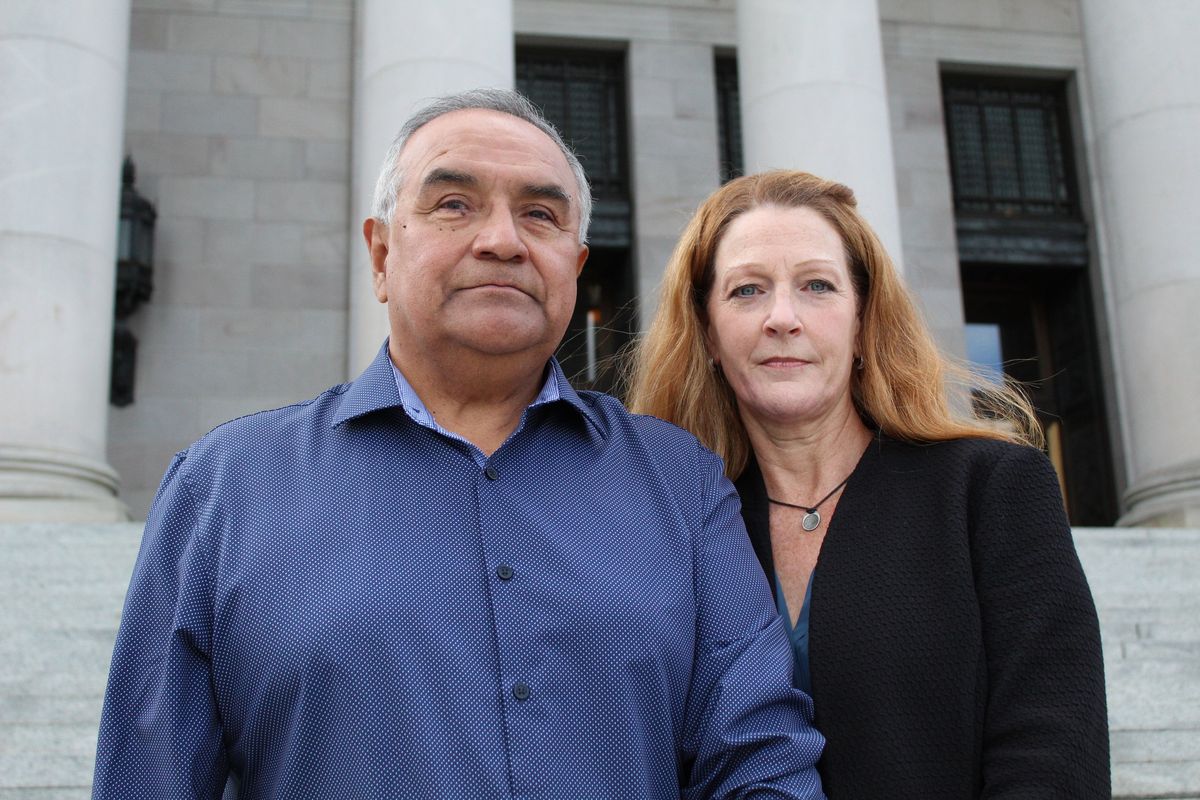Difference Makers: Jolayne Houtz ‘lives alongside the grief’ of her son lost to hazing, founded an organization to prevent other deaths

Each time a news outlet reports a hazing incident on a college campus, Jolayne Houtz knows about it.
The Google alerts ping her phone multiple times a day, each notification pouring salt in the wound left by her son’s death in 2019.
Her son Sam Martinez died his freshman year at Washington State University after being hazed by his fraternity brothers at Alpha Tau Omega. They gave the 19-year-old a half gallon of rum and pressured him to “drink the family drink” until he died in the frat basement of alcohol poisoning.
Though an unrelenting reminder of the loss of her big-hearted, athletic and goofy son, Houtz is compelled to document each instance of hazing that makes headlines, compiling them into a national database of her own creation, the first of its kind.
“We can get stuck in the grief, or we can try to live alongside the grief and channel that into something good for others,” Houtz said.
In the years since their son’s death, Houtz and husband Hector Martinez’ grief and passion have become the fuel driving their tireless advocacy. The couple successfully pushed for two hazing-related Washington laws in Sam’s memory and then joined a coalition lobbying for a national law, the Stop Campus Hazing Act, that President Joe Biden signed on Christmas Eve.
Hazing is defined as degrading, forceful and dangerous initiation practices often associated with Greek systems at universities. Often, students are hazed by their older peers in an organization, pressured to drink in excess or do strenuous physical activity as a sort of initiation ritual into that group.
These laws, Houtz hopes, will aid in her endeavors with her organization HazingInfo.org that lists hazing incidents across the country into a database for the reference of students and parents to make informed decisions.
“Let’s say a student is interested in five different schools, I would like us to get to the point where it’s a must do item on somebody’s school checklist,” Houtz said. “As they’re thinking about which school to go to, they can compare schools in lots of different ways, and I think hazing prevention and a sense of how seriously each campus takes hazing prevention is a really important consideration.”
When her son told her he was thinking about pledging a fraternity at WSU, Houtz did her homework in researching the fraternities. She learned about community service, study tables and the camaraderie found in brotherhood, but nothing about the group’s history of hazing or any risks to her son.
Houtz founded her organization seeking to ensure future parents and students are more informed than she.
She partnered with the University of Washington Information School to design the site and gather data as well as other anti-hazing advocacy and research group StopHazing.org founded by Elizabeth Allan, a professor and researcher at University of Maine college of Education and Human Development whose research focuses on hazing. The university is another partner of Houtz’s organization.
The site includes data from the nine states with laws on the books requiring universities to report hazing, including Washington, thanks to Sam’s family’s lobbying. Biden’s Christmas Eve signature will make their database more comprehensive in the coming years, Houtz expects.
The Stop Campus Hazing Act mandates every college in the nation must post hazing incidents publicly and include hazing incidents in their annual campus safety reports, where they detail data and information about campus crimes.
The thought that school administrators may know of instances of hazing without publicizing them is “maddening” to Houtz.
“Yet students and families who are spending tens of thousands of dollars or more to go to that institution aren’t allowed to have that information, that’s wrong,” Houtz said. “I am really looking forward to the day that all of that information is free and open and accessible.”
Houtz partnered with Allan, a hazing researcher of nearly 30 years, while developing the database as Allan was working on a similar endeavor through her organization StopHazing.org.
Allan’s landmark 2008 study that surveyed over 11,000 students at 53 universities reported that 55% of students involved in campus organizations experienced hazing, only one of ten of them recognizing the actions as hazing.
Allan has since relaunched the survey to compile more recent data.
She said that Houtz’ project will not only lead to empowered decision-making from prospective students and families, but raise awareness of hazing, a practice that thrives in a “culture of secrecy,” Houtz once said.
“Many people still don’t understand why hazing is a problem and how widespread it is,” Allan said. “This will help to provide that evidence, bring it all together, aggregate it so that people can begin to see patterns and have easy access to information.”
Houtz, who lives in Bellevue, left her job at the University of Washington in 2023 to focus her energies on HazingInfo.org, where she has a clear vision and a keen ability to focus on both the small details and the big picture, said Nam-ho Park, a UW Information School professor who leads a team of students working on the database.
Not only is she easy to work with, Houtz is an “inspiration” to Park and the team.
“For me personally, just getting the work done is one thing, but carrying that responsibility and advocacy that is grounded in an incredibly painful experience- that’s the part that inspires me most,” Park said. “She channels it in a way that she really wants to save lives and not let anybody else go through something that she and her family went through.”
Still tuned into her organization, Houtz now splits her time between her home in Bellevue and with family in Puerto Vallarta Mexico, the sunny beaches and smiling strangers a welcome reprieve from the dreary Washington winter.
“It’s nice to be in a place where you’re not known as that mom who lost her son, you get to think of something else to talk about,” Houtz said. “Maybe you end up sharing that information, but maybe you don’t. It can be a breath of fresh air.”
The getaway is part of Houtz’ and her husband Hector Martinez’ healing. The couple still live in the home where they raised Sam, regularly driving past his old high school and other haunts while going about their day.
“That’s bittersweet,” she said. “I want to remember, but it’s also hard to remember.”
Every year, Sam’s family and friends gather at his old summer camp in Port Orchard for a weekend of work projects they call Camp Sam. They’ve planted a tree in his memory and installed a new basketball court to honor the young athlete.
Nicole Ballard is a regular attendee of the camp. A friend of Sam’s, the two grew close over canoe rides and games of capture the flag at camp in their childhood.
“I always remember Sam as someone who was really funny and goofy, really silly; he loved pranks and jokes and just being funny,” Ballard said. “But he was also really caring, he was a great listener. He had a really big heart and he always welcomed people.”
She thinks of him daily, reminded when she sees anything blue, his favorite color.
“Every year, knowing that we’re going to camp together and that we get to see Jolayne and Hector and the Martinez family, it’s almost like reconnecting with part of Sam, ” Ballard said.
Houtz is dedicated to keeping Sam’s friends close, Ballard said, both by including them in her advocacy work and planning family dinners to keep everyone connected personally. Ballard has grown closer to Houtz since Sam’s passing, knowing Houtz can be counted on for a warm hug or a listening ear, just like how Ballard remembers Sam.
Houtz is sharp, determined and competent, those who know her said.
“She just doesn’t give up. She knows what she wants, and she goes and she fights for it,” Ballard said. “She does it in the name of love; that’s what I find so beautiful.”
Sam is typically at the top of Houtz’ mind when she wakes up, treasuring memories in the stands of baseball games watching her little athlete go up to bat as a kid, mimicking the gestures of his favorite ball players like former Mariner Ichiro Suzuki’s famous sleeve tug.
“He loves sports, and I just always felt so proud watching him, and he was a good teammate,” Houtz said. “I think he really played with everything he had, as his coach said, he was to leave it all on the field. He was a quiet leader on the field, and brought his teammates together around that shared mission of getting a win.”
Sam played on a rec soccer team at WSU, where he studied business. Now, Houtz can only wonder if her son would have played other sports at school, or what career he would have entered, or who he might have married someday.
“That’s the heartbreak, all the milestones that you miss, and seeing him search for himself and find himself and become the man that he would be,” Houtz said.
The wedding of their daughter Ariana Martinez Lazo is “one of the bright spots” for Houtz and Martinez since Sam passed. Houtz is enjoying getting to know her new community in Puerto Vallarta with her family.
Though painful to dedicate so much time to the cause and “live inside the cause of death of your child,” Houtz finds comfort in knowing her efforts could prevent the hazing deaths of others.
“I’m definitely trying to put my heart back together again, and HazingInfo.org is one thing that’s helping me do that,” Houtz said. “It’s not too much to say that our family was shattered by Sam’s death, and HazingInfo is definitely one way that we are trying to find our way out of the abyss.”
